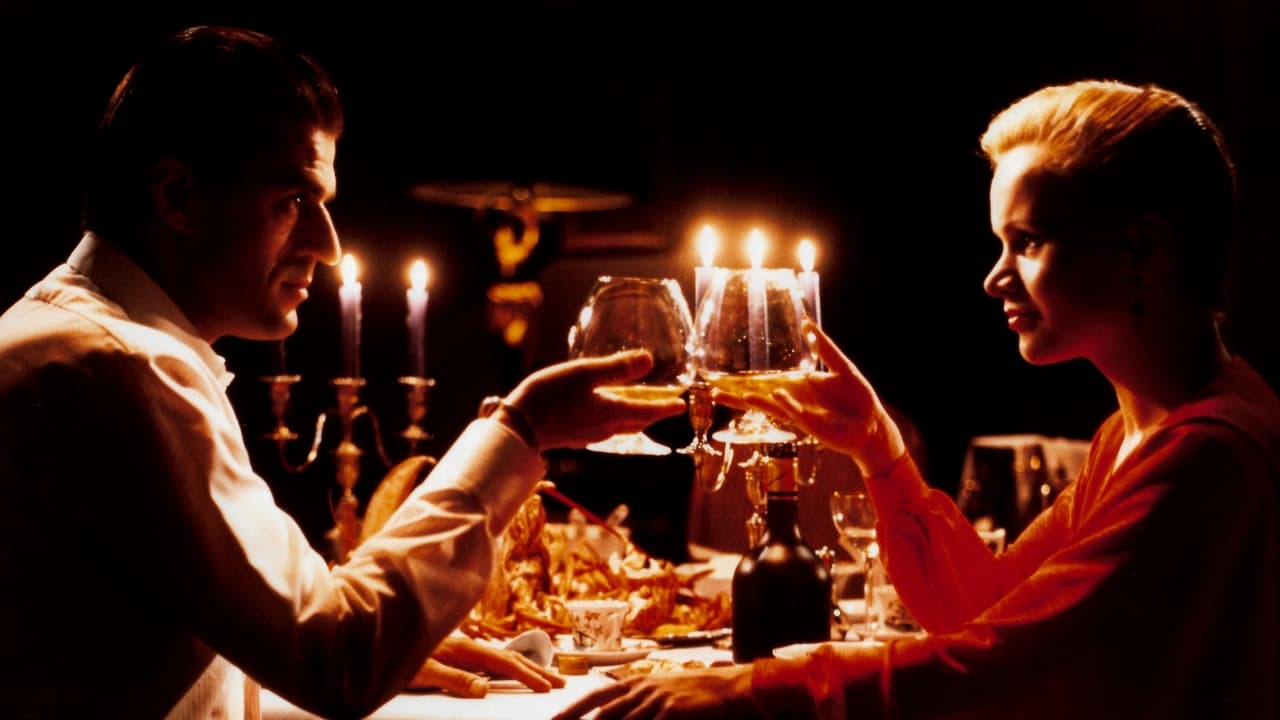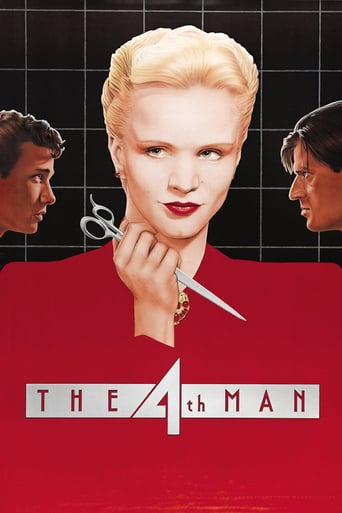Robert Joyner
The plot isn't so bad, but the pace of storytelling is too slow which makes people bored. Certain moments are so obvious and unnecessary for the main plot. I would've fast-forwarded those moments if it was an online streaming. The ending looks like implying a sequel, not sure if this movie will get one
Stephanie
There is, somehow, an interesting story here, as well as some good acting. There are also some good scenes
Aspen Orson
There is definitely an excellent idea hidden in the background of the film. Unfortunately, it's difficult to find it.
Isbel
A terrific literary drama and character piece that shows how the process of creating art can be seen differently by those doing it and those looking at it from the outside.
grahamcarter-1
Paul Verhoeven like Dario Argento and Brian DePalma, is a film-maker who likes to answer his critics via his work. After having worked in films that were approached in a more realistic and naturalistic milieu (1973's 'Turkish Delight', 1980's 'Spetters'), Verhoeven found in a novel by Gerard Reve a perfect collective of ideas that suited what would become his cinema; dark eroticism, religious imagery, the Catholic tension of woman worship and misogyny, death, and the grip ideas of the fantastique can have on the mind. He completely embraced the 'Giallo' approach and blends sex and death in a delicious cocktail of suspense and imagery in 'The Fourth Man'.A tale of seduction and paranoia is told via a writer of lurid pulp fiction, Gerard Reve (yes the novelist names the lead character after himself!). Appearing as a keynote speaker at a book seminar, he responds to a questioner who asks how he can still be a Catholic with all science has taught us; "Being Catholic means having imagination!" Catholic, homosexual and alcoholic, he is bursting with emotional tension, ripe for hysteria; "I lie the truth, until I no longer know whether something did or didn't happen." Over the opening credits a spider traps flies in its web, religious iconography is introduced as the web is spun over a crucifix. Verhoeven quickly establishes the fact that Reve has a dark psyche and darker fantasies, such as strangling his male lover with whom he shares a mutual loathing; he quickly and constantly slips into 'Walter Mitty' like daydream fantasy. When he takes a train to the seminar illustrates well Reve's mind-set; he reads a billboard 'Jesus Is Everywhere,' as a young mother boards the train. She offers her son an 'apple' and fashions a circle out of the peel, which as she manipulates it for a moment resembles a halo over the baby's head.Linking sex and death and self-destructiveness is achieved when Reve asks a gentleman at the station if he has come to collect him. The man replies "I doubt it" as a coffin is wheeled towards him; the following discussion establishes the corpse had a beautiful death, as he was about Reve's age and died in bed "on top of some senorita in Spain." As a homosexual it is curious as to why Reve becomes interested in Christine Halsslag. She does have short hair, but is also voluptuous; he covers her breasts with his hands when they first have sex; as he ejaculates he exclaims "through Mary to Jesus!" Coincidence comes into play when Reve discovers Christine is seeing Herman, a man that Reve bumped into before catching his train. He wants to meet Herman; "What a body… what a piece!"Reve essentially ends up as the requisite 'Giallo' outsider, who finds himself in the position of trying to solve a mystery; 'did Christine kill her previous husbands?' His sight is certainly brought into question. Verhoeven has fashioned a world that at times borrows the lurid surrealism of Argento's 'Suspiria', and photography that frequently mimics the soft focus over saturated white flaring of a DePalma film of this era. There is a nice bit of eyeball gouging in a car accident that would be at home in an Umberto Lenzi 'Giallo.'Loosely remade by Verhoeven in Hollywood as 'Basic Instinct'; he considers 'The 4th Man' to be a 'spiritual prequel.'
gridoon2018
In other words: pure Paul Verhoeven. This sophisticated black comedy is not for the easily offended, but it made me laugh out loud on several spots ("if she gets a fourth one, they can play bridge!"). Verhoeven is one of the few directors who can mix horror and comedy so effortlessly (this was the main virtue of his otherwise disappointing latest feature, "Elle"). This is the movie that got him the ticket to Hollywood, and it's very easy to see why; it's probably the most entertaining erotic thriller of the 1980s (along with Brian De Palma's "Body Double"), just like the thematically similar "Basic Instinct" is probably the most entertaining erotic thriller of the 1990s. *** out of 4.
Jackson Booth-Millard
Before making it big in Hollywood with hit films RoboCop, Total Recall, Basic Instinct and Starship Troopers, and not forgetting critically slated Showgirls, Dutch film director Paul Verhoeven was still making films in his native Netherlands, and this was the last before he left for the States, and one to feature in the book 1001 Movies You Must See Before You Die. Basically Catholic alcoholic and bisexual novelist Gerard Reve (The Living Daylights' Jeroen Krabbé) has frequent nightmares and visions of his possible impending or future death, but he tries to carry on as normal, leaving Amsterdam to the Vlissingen Literary Society to deliver a lecture, and on his journey he spots a handsome young man he is very attracted to, but he leaving on a different train. Following the lecture he is the introduced to the treasurer of the literature club and wealthy widow Christine Halsslag (Renée Soutendijk), also a beautician and the owner of the Spider beauty shop, and they have a one night stand, unaware that she already had a boyfriend, and in a photo he finds out it is the young man he saw in the train station. Gerard urges Christine should bring her boyfriend Herman (Thom Hoffman) so he can meet and spend some time with him, of course if he was to come for a few days his secret intention is to seduce the man he longs for. She agrees to this and leaves Köln to go and get Herman, while Gerard stays alone in her house, he just drinks whiskey and looks around her place, including inside a safe containing the film reel footage of her three previous marriages, and he finds out eventually that these three men all died while married to her. When Gerard does meet Herman, he first obviously questions her marriages and tells him that they simply all died in tragic accidents, but at one point while walking through a graveyard with Herman, and briefly seducing him, the two of them discover a secret crypt full of incriminating dark contents. Gerard is at that point sure that Christine is a Black Widow, i.e. a witch, and intends to marry Herman and perform some sort of dark spell so he will die in what looks like an accident as well, he could be "the fourth man", but the boyfriend thinks he is jealous and wants to scare him off and keep her for himself. They get into a bit of a squabble and drive recklessly, and they end up together in severe car accident, Herman is impaled through the eye with a pipe, but Gerard survives and is determined to prove Christine is an evil being and could kill him next, but in the end doctors catch him and believe him to be crazy, and he ends up in comatose and the nasty woman gets away with it. Also starring Dolf De Vries as Dr. De Vries and Geert De Jong as Ria. Krabbé gives a good leading performance as the sexual predator and unknowing victim of a dark series of witch crafted murders made to look like accidents, and Soutendijk is a suitable choice for the Femme Fetale who turns out to be some kind of sorceress with dark intentions, it is a simple enough story about doomed sexual desires and almost like a fatal attraction sort of vibe, but it does have the funny moments as well, it works as a fun black comedy thriller. Very good!
Perception_de_Ambiguity
Not even a year ago I probably would have said that 'The Fourth Man' insults my intelligence as a viewer for lacking a good sense of realism among other things, but it really is an unapologetic Catholic fairy tale put into the dress of a thriller. There isn't much about this plot that is realistic, some of it even was played deliberately campy, it seems, I'm especially thinking of the flashbacks that show the deaths of certain characters, if you have seen the film you will know which scene I'm thinking of, it's like out of a Hammer film production. If we wouldn't know better from Paul Verhoeven's body of work we would assume that the film was made by a religious fanatic who really believes in occultism, prevision, the literal truth of the bible and other mythical matters and wants the audience to believe all of them too. 'De vierde man' - if it wants to be cherished - certainly requires its audience to just roll with it and accept those things as a given for the sake of the film.What really is the intended appeal for the audience is questionable overall since we know from start on that the blonde (Christine) has nothing good in mind for Gerard (while for long passages it plays it relatively straight as a romance where the viewer is supposed to care for both characters) and that it involves fantastic elements, although to which extend those things are true and prevalent we find out during the course of the movie, and I have to say that it goes all the way in both affairs. How it uses homosexuality as a plot device...I don't want to say it trivializes the topic, but it really is used without much psychological depth, it doesn't make Gerard a much more complex character, instead it feels like it's just used to drive along the plot and as such it feels tacked on. But it's funny how this creates a plot situation that is reminiscent of 'Lolita'. Gerard agrees to stay with the blonde just to get to her boyfriend who he is in love with, so Gerard plays the lover in order to reach real love, and again it is sort of a taboo love, certainly not as taboo as the love of Humbert Humbert to the 12-year-old Dolores, but still.No doubt 'De vierde man' should have an appeal to fans of surrealist cinema with its blunt symbolism and the protagonist's fears turned into physical reality, without the filmmakers giving a priority to plausibility or even coherence, not even coherence of characters. Christine not only is the personified evil who in retrospect can't convince as a being with a soul, but her ability to foresee so precisely how Gerard would act upon her vicious setups can't make her human, and that's where we come full circle, because it is an unapologetic fairy tale and as such it's not necessary for its characters to be convincing human beings, it's enough for them to be human-like. For films though I can not so easily accept this concept and it's a reason why eventually I wasn't all too satisfied with the film. But I have become more open to films that lack plausibility if there is a reason for it. In this case there is a reason but I'm not convinced of the preciousness of it. It made for an entertaining thriller that shows some inventiveness and trippy pictures but that I think substantially is eventually not more than a rather shallow Catholic fantasy.

